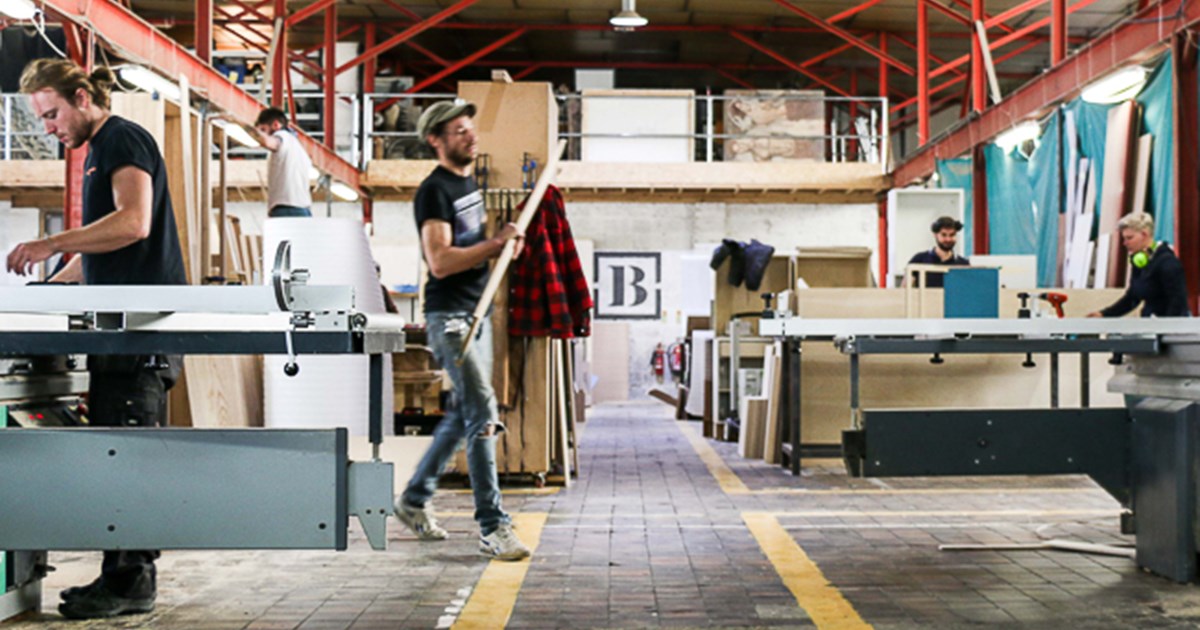
Hole & Corner Feature
Originally published in Hole&Corner Magazine
Making Space: Building BloQs
—
In the last of our features on London making spaces, we talk about purpose, collaborative values and the power of community with Al Parra – one of the four founders of Building BloQs in Enfield, set to become the largest open access making workshop in Europe…
When and why was Building BloQs started?
Born very much of necessity, we started Building BloQs in the summer of 2012. Our workshop lease had run out and we needed a new one, fast. Finding a new place was proving tough and what little there was had absolutely ballooned in rent. Loads of our fellow makers were in the same boat. We needed a solution to what was a real and present personal issue but, we had come to realise, was a systemic problem. What we decided to do was build the best workshop we could imagine and share it with as many people as needed one.
Can you describe the space?
Our building has a long, low front, painted a warm orange. Passing through double doors, you enter the workshop floor and the full height and expanse of the building’s 11,000 square feet becomes apparent. Neat rows of workbenches sit in fabrication bays with smart yellow lines on the tiled floor. On the floor there are machine shops, the spray booth, our CNC room and consumables store, a green and black furnace that burns all our offcuts to keep us all warm and, in the farthest corner, storage racks for members’ tools and materials. A welcoming café with long tables and benches leads to the textiles studio with its new machines, white walls and blonde birch flooring. At the moment we have a comprehensive range of machines for making in wood, metal and fabrics as well as facilities for spray finishing, laser cutting and digital routering – and there’s lots more to follow.
You'll soon be known as the largest open access space in Europe – what does that mean to you?
For our community, the most exciting aspect is the large diversity of skills and trades all working alongside each other in one hub. The possibilities for cross-pollination get exponentially better. However, we may not be the largest for long! We think that open access working will become a more frequently used model as its benefits are recognised and we look forward to that day.
What kinds of creative industries do you cater for?
At BloQs we like to talk about raw materials. What we provide is a facility where raw materials can be processed into products. At the moment we cater for professionals who need these facilities to process wood, metal and textiles and their related materials. On the workshop floor you might find cabinet makers creating wardrobes, alongside a team from a tech company prototyping a new product line, whilst in the far reaches of the metal shop you’ll find blacksmiths forging steel. Guitars, boats, furniture, suits, gates and theatre sets are amongst the extraordinary range of things our talented membership creates here.
Do you have a particular philosophy or set of values?
Basically this is our shtick – if people need access to a facility like BloQs to make a living, they should have it. The idea of putting a resource, like a workshop, in a community is nothing new. The innovative bit comes in creating the system that shares it fairly, effectively and affordably. Once you’ve got that cracked, you can go on applying the principle to whichever resource the community needs next, be that a transport or a science resource, an energy generation system or who knows what! Empowering people to actually have influence in how they live their lives is thrilling. Most of us as Londoners are constantly at the mercy of remote systems and big money that shapes our city. People want to participate in their city; give them the chance and they will. What we’re doing with our workshop is contributing a small but vociferous voice to the much larger conversation about what kind of London we want to live in. OK, you can have your soapbox back now, thanks!
How have you seen London’s creative network develop since Building BloQs started?
In terms of open access, our experience is of a real groundswell of collaborative spaces being established in London in reaction to the current climate and to cater for the city’s creative network. We’re co-founders of a group called Open Workshop Network. It’s a cluster of London’s open workshops, makerspaces and hackspaces. It’s not just a London phenomenon; across the country, from MAKLab in Glasgow to Old Market Manor in Bristol there are workplaces supporting a community of makers, artists, designers and artisans. It’s so vibrant and diverse. It’s really fascinating to be a part of it.
What have you learned from working in an environment like Building BloQs?
First of all, don’t do it alone, it's more fun with a team. Make sure you have a purpose beyond money, you’re much more likely to stick at something you believe in and don’t worry; if you’re successful the money will follow. In fact, worry less and do more!
What are some of the challenges to running a collaborative space?
Convincing the suits we weren’t crazy was quite a challenge. What we’re doing at BloQs hadn’t really been done before, especially for professional makers, so banks and lenders looked as us very suspiciously and were reluctant to provide funding. The initial response was often 'Not for profit? Never been done before? No overdraft for you.' Our response was to do it ourselves, self-funding, little by little doing what we could until we’d proved ourselves and our point.
Creating systems that provide access flexibly and fairly has been a challenge. Our membership system and revenue stream went through several iterations before we settled on a system that seemed to work for both members and the community.
What we found along the way was quite a limited tolerance from the wider legal, financial and corporate world and its systems for anything new. One might say that in many ways our biggest challenge was standing our ground and articulating a dynamic concept to an inflexible system.
Does Building BloQs have, or plan to have, a community outreach programme?
Community is in the very DNA of Building BloQs. As BloQs grows we are devoting more resources to community outreach and anticipate developing an established long-term programme as part of our strategic development. Outreach is important to us on a number of levels. First of all it’s a way of demonstrating to young people in our area that they can forge a future for themselves in making; that the options aren’t only the service sector or X Factor. It’s also a way of reaching the people who have good ideas for microbusiness and need the right environment to start in. With time our outreach will help point the way to the training opportunities we’ll provide, together with our partners ACAVA Studios and Enfield Council. We see outreach as binding us to our community so they can benefit and take pride in something interesting and innovative happening in their neighbourhood.
What’s the best piece of advice you’ve been given?
KISS – Keep it simple, stupid. If it’s getting too complex and hard to understand then the chances are other people will find it hard too. Stop, make it simpler, go forward again.
A hole-and-corner is a secret place hidden away from the hustle and bustle of daily life: Where is your own hole-and-corner?
The sofas in the corner of our café make a good place to hole up. BloQs is in a middle of an industrial estate in Edmonton so already somewhat removed from the hustle and bustle, although there’s plenty of that in the workshop. Personally, out of hours, there’s a certain snug, in a certain café bar in a corner of North London that is my own favourite bolthole. Anymore than that would be telling!
__
Interview: Nicholas Hitchcock
Photographs: Johanna Ward
